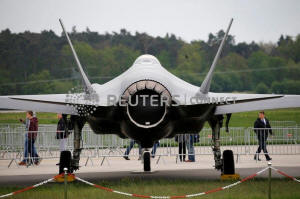|
U.S. halts F-35 equipment to Turkey,
protests its plans to buy from Russia
 Send a link to a friend
Send a link to a friend
 [April 02, 2019]
By Mike Stone and Humeyra Pamuk [April 02, 2019]
By Mike Stone and Humeyra Pamuk
WASHINGTON (Reuters) - The United States
has halted delivery of equipment related to the stealthy F-35 fighter
aircraft to Turkey, marking the first concrete U.S. step to block
delivery of the jet to the NATO ally in light of Ankara's planned
purchase of a Russian missile defense system.
U.S. officials told their Turkish counterparts they will not receive
further shipments of F-35 related equipment needed to prepare for the
arrival of the stealthy jet, two sources familiar with the situation
told Reuters on Monday.
The Pentagon confirmed the Reuters report that the equipment delivery
had been stopped.
"Pending an unequivocal Turkish decision to forgo delivery of the S-400,
deliveries and activities associated with the stand-up of Turkey's F-35
operational capability have been suspended," Air Force Lieutenant
Colonel Mike Andrews, a Defense Department spokesman, said in a
statement.

Turkish President Tayyip Erdogan has refused to back down from Ankara's
planned purchase of a Russian S-400 missile defense system that the
United States has said would compromise the security of F-35 aircraft.
The disagreement over the F-35 is the latest of a series of diplomatic
disputes between the United States and Turkey including Turkish demands
that the United States extradite Islamic cleric Fethullah Gulen,
differences over Middle East policy and the war in Syria, and sanctions
on Iran.
The sources, who spoke on condition of anonymity, told Reuters the next
shipment of training equipment, and all subsequent shipments of F-35
related material, had been canceled. The aircraft is built by Lockheed
Martin Corp.
A Pentagon official had told Reuters in March that the United States had
a number of items it could withhold in order to send Turkey a signal
that the United States was serious about Ankara dropping its ambition to
own the S-400.
Turkish officials in Ankara were not immediately available for comment.
Turkey has said it will take delivery of the S-400s in July.
NATO SUMMIT
The U.S. decision on the F-35s was expected to complicate Turkish
Foreign Minister Mevlut Cavusoglu's visit to Washington this week for a
NATO summit. On Sunday, Erdogan suffered one of his biggest electoral
losses in decades in local elections.
"Certain Russian weapon systems are seen as inherently threatening to
the United States regardless of who is operating them and for what
purpose," Andrew Hunter, a fellow at the Center for Strategic and
International Studies, said.
"Because Turkey is not just an F-35 purchaser, but an industrial
partner, blocking delivery of these systems represents a major
escalation by the United States as it threatens to impose serious costs
on both sides," Hunter said.
[to top of second column]
|

A Lockheed Martin F-35 aircraft is seen at the ILA Air Show in
Berlin, Germany, April 25, 2018. REUTERS/Axel Schmidt/File Photo

Reuters reported last week that Washington was exploring whether it
could remove Turkey from production of the F-35. Turkey makes parts
of the fuselage, landing gear and cockpit displays. Sources familiar
with the F-35's intricate worldwide production process and U.S.
thinking on the issue last week said Turkey's role can be replaced.
The United States and other NATO allies that own F-35s fear the
radar on the Russian S-400 missile system will learn how to spot and
track the jet, making it less able to evade Russian weapons.
In an attempt to persuade Turkey to drop its plans to buy the S-400,
the United States offered the pricier American-made Patriot
anti-missile system in a discounted deal that expired at the end of
March. Turkey has shown interest in the Patriot system, but not at
the expense of abandoning the S-400.
Turkey has engaged with U.S. negotiators in recent days about buying
the Patriot system, a person familiar with the matter said on
condition of anonymity. The system is made by Raytheon Co.
Turkish Defense Minister Hulusi Akar in March said that despite some
issues, Turkish pilots were continuing their training at an air base
in Arizona on the F-35, each of which costs $90 million, and that
Ankara was expecting the aircraft to arrive in Turkey in November.
By halting jet deliveries, the Pentagon could subsequently delay
training of Turkish pilots. Two additional jets are scheduled to
arrive in Arizona in April and a significant delay could impact
Turkey's November target date for operations.
U.S. lawmakers also have expressed alarm over Turkey's planned
purchase of the Russian system. Four U.S. senators last week
introduced a bipartisan bill that would prohibit the transfer of
F-35s to Turkey until the U.S. government certifies that Ankara will
not take delivery of the S-400 system.

Following news of the halt, U.S. Senator Jeanne Shaheen, one of the
bill sponsors, said she was glad to hear the administration was "to
delay the transfer of F-35 equipment to Turkey to help ensure U.S.
military technology and capabilities cannot fall into the hands of
the Kremlin."
(Reporting by Mike Stone and Humeyra Pamuk in Washington; editing by
Will Dunham, Howard Goller and Lisa Shumaker)
[© 2019 Thomson Reuters. All rights
reserved.]
Copyright 2019 Reuters. All rights reserved. This material may not be published,
broadcast, rewritten or redistributed.
Thompson Reuters is solely responsible for this content. |